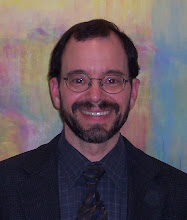As I was leaving our local library this afternoon, I saw a copy of a free newspaper put out by an organization that promotes the study of Kabbalah. As is well known, Kabbalah has become very popularized in our society. I thought that it might be interesting to take a look at this newspaper and see what it does to promote Kabbalah's appeal.
Before I had the chance to do that, I saw something that immediately distanced me from the entire enterprise. Just about the first thing I saw in the newspaper was a sentence on the front page: "The men who wrote the Zohar were a group of ten great Kabbalists led by the famous Rabbi Shimon Bar Yochai (RASHBI)."
What fascinates me -- and depresses me -- about this sentence and its prominent place in this magazine is that it is so blatantly false. Scholars don't know everything about the creation of the Zohar, but one thing that they know for certain is that it wasn't written by Rabbi Shimon Bar Yochai. Yes, the Zohar is attributed to him. Yes, the text purports to be a collection of tales and commentaries written by RASHBI and his colleagues and disciples. But the work was written in medieval Spain. RASHBI -- if he existed -- was a Talmudic sage who died a millenium earlier. (For a good introduction to the Zohar, consult A Guide to the Zohar (2004) by Arthur Green, published by Stanford University Press.)
Now, someone might ask: Does it really matter? Does it matter who wrote the Zohar? After all, people turn to Kabbalah because they are drawn to mysticism. They are drawn to Kabbalah because they are seeking answers to personal issues and quandaries. It's probably irrelevant to them that the Zohar was written in the Middle Ages and not in Late Antiquity. If it doesn't matter to them, should it matter to anyone? Does it matter at all?
I believe that it does. To me, truth is actually important. I say "actually," because you would think that any religious leader would care about truth. But many religious leaders, though they care about religious truth -- that is, truth with a capital "T," -- they don't care about historical truth. Historical truth is just not relevant to them. And so, if "the tradition" teaches us that the Zohar was written in the 3rd century by RASHBI, that's what happened, and we have no need to question it. The authors of this article are probably saying to themselves, "We 'know' who wrote the Zohar. We don't want to hear about, we don't want to know about, any research that would question that 'fact.' Indeed, questioning that fact may be religiously offensive."
I have a problem with that. To me, Judaism has always been inspiring. It's always been a source of comfort, a source of inspiration. But truth matters to me. It matters a lot. I could never teach people what I know to be false, any more than I could teach them to do what I know to be wrong. And truth matters to me not because of who I am, but because of what Judaism teaches. In our tradition, the word "emet," (truth), is "the seal of God." God desires truth. That which is untruthful is not consistent with our understanding of God's will. To spread falsehood is hardly a praiseworthy religious act.
And so, this little sentence in this newspaper discredits the entire newspaper -- from my perspective. It renders everything that its publisher produces suspect. The people who produce this newspaper don't seem to care about historical truth in the way that I do -- how then can I learn religious lessons from them?
And so, before writing this blog, I tossed that newspaper into the trashcan. However interesting those articles might be, however much I wanted to enjoy that newspaper, I knew it was going to leave me disappointed and discouraged.
Tuesday, February 16, 2010
Subscribe to:
Post Comments (Atom)

No comments:
Post a Comment